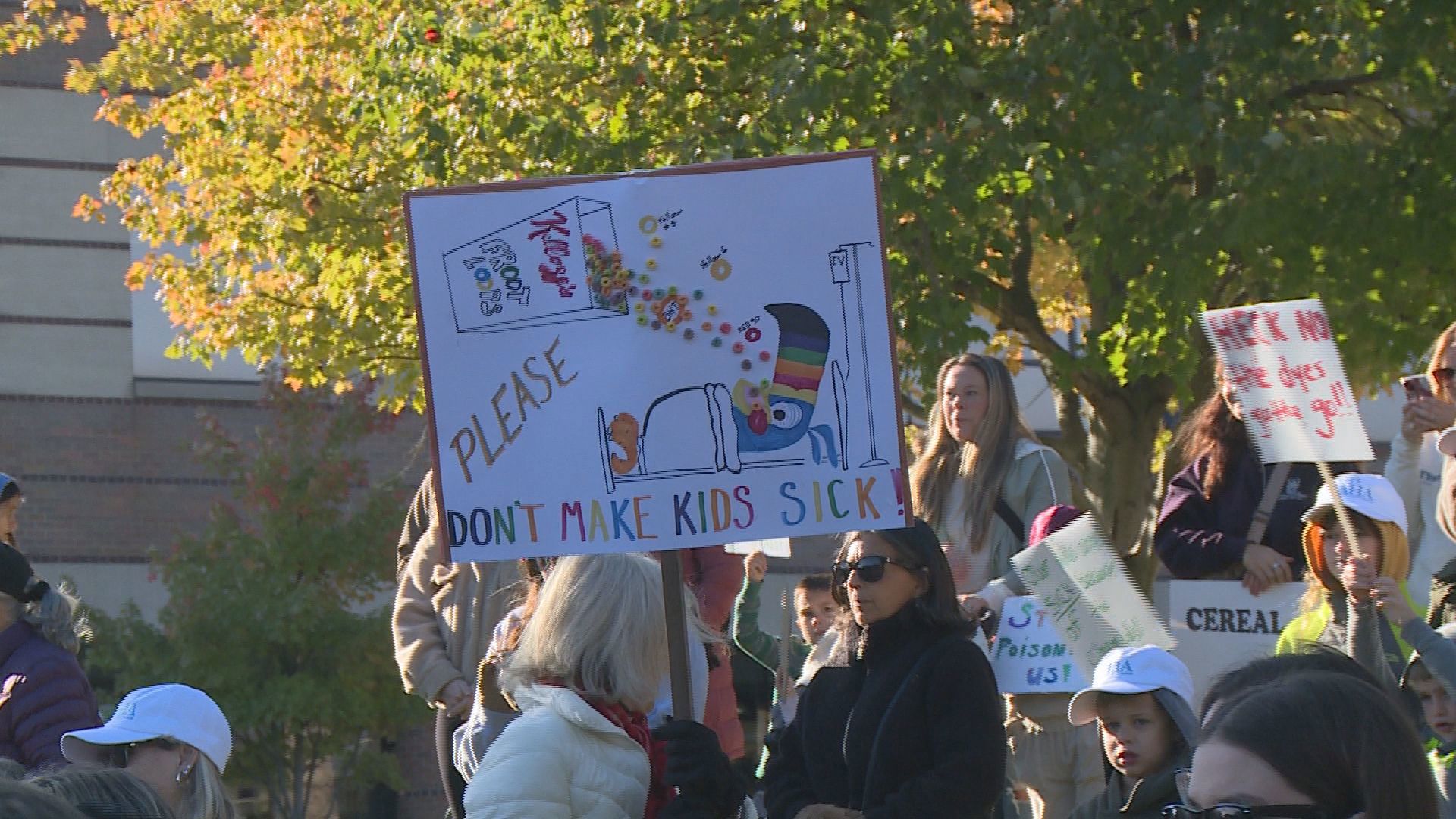BATTLE CREEK, Michigan —
More than 1,000 people marched up to Kellogg's headquarters in Battle Creek, claiming the company didn't fulfill a promise to consumers.
Protestors say the cereal giant continues to use artificial dyes and the preservative BHT in children's cereal.
The action began at nearby Friendship Park around 10:30 a.m. Tuesday. Protestors then walked down Kellogg's headquarters, where they stayed all afternoon.
More than 200,000 people signed a petition addressed to Kellogg's on the matter. National activist and food author Vani Hari delivered the petition.
Hari, who calls herself “The Food Babe,” has 1.9 million Instagram followers. She claims Kellogg’s products “affect children’s brains” and that artificial food dyes are “linked to hyperactivity in children, autoimmune disorders, allergies, asthma, eczema” and “cancer in animal studies.”
The Federal Drug Administration says on its website: “The FDA has reviewed and will continue to examine the effects of color additives on children’s behavior. The totality of scientific evidence indicates that most children have no adverse effects when consuming foods containing color additives, but some evidence suggests that certain children may be sensitive to them.”
A pediatrician also came all the way from Los Angeles to join in on the fight.
"Our kids are getting sicker and sicker, and it's time to address this head-on. 50% of our children now suffer from a chronic disease. One in three children are diabetic or pre-diabetic. Obesity is at an all-time high. When I was born zero states had a 20% obesity rate. Now every single state has at least a 20% obesity rate," said Dr. Patrick Joseph Walsh.
Kellogg’s does produce cereals with natural dyes in places like Canada, Europe, Australia, and India, Hari says.
“Back 20 years ago when Europe enacted a standard that says that you must have a warning label on a product that has artificial food dyes,” she said in an interview with 13 ON YOUR SIDE ahead of the protest. “The warning label says may cause adverse effects on activity and attention and children.”
One of the people supporting Hari on the 15th is State Representative Brad Paquette (R-Niles).
“It goes across the spectrum, the political spectrum,” he said. “And so I get to, I'm really excited to go hang out and fellowship with some of these folks and talk about what matters most, and that's trying to make America healthier than it is right now.”
Paquette started to get into nutrition after studying abroad in Spain, where he found the food and lifestyles healthier.
He also pointed out how in other areas, Kellogg’s is able to make cereals without artificial dyes and that these foods are promoted to children.
“When you're talking about food, you're talking about targeting children, and you're talking about even the things that you just mentioned there, the addictiveness, you know, the hazard chemicals that make up these, these things that we're ingesting every single day here in the United States, here in Michigan.”
Because of things on the legislative side, Paquette said there may be some more push to legislators to get a statewide, or even national level, ban on artificial dyes.
“I'd expect next term that in our Health Policy Committee will call [Kellogg’s] in, and we'll ask them ourselves, and we'll look at some legislation. I know some of my colleagues in the House and the Senate have bills to ban the red dyes, things like that,” he said. “I feel like this is just the beginning of a significant movement. I'm pretty sure Kellogg's knows, I'm sure they're doing their homework on this, because this isn't going to go away anytime soon.”
13 ON YOUR SIDE reached out to Kellogg's for a statement ahead of the protest. They sent us to their website, which said the following:
“The quality and safety of our foods is our top priority. Our products – and the ingredients we use to make them – are compliant with all applicable relevant laws and regulations and we remain committed to transparently labeling our ingredients so consumers can easily make choices about the food they purchase.
Today, more than 85 percent of the cereal we sell contains no colors from artificial sources. In fact, we continuously innovate new cereals that do not contain colors from artificial sources across our biggest brands, offering a broad choice of nourishing foods for our consumers. This approach is consistent with our commitment to meet evolving consumer preferences.
At WK Kellogg Co, we believe in the positive impact our foods have on overall health and we continue to evolve our portfolio to provide positive nutrients. According to Dietary Guidelines for Americans 2020-2025, many consumers are falling short on fiber, iron, folate or Vitamin D.
All of our cereals contain a good source of at least one of these shortfall nutrients including fiber, iron, folate and Vitamin D.
More than 70% of our cereal recipes contain at least 8g of whole grain.
Additionally, more than 140 of our offerings are a good source of fiber. C
Cereal contributes less than 5% of added sugar in the US diet and cereal eaters consume no more added sugar in their diets than non-cereal eaters. In fact, the majority of our foods contain less than 50 calories from added sugar, per serving.”

